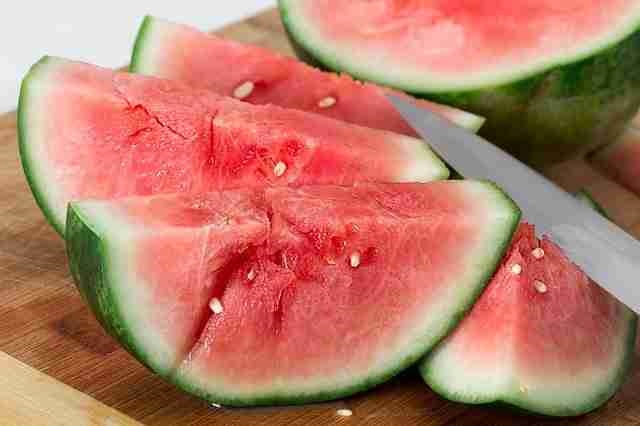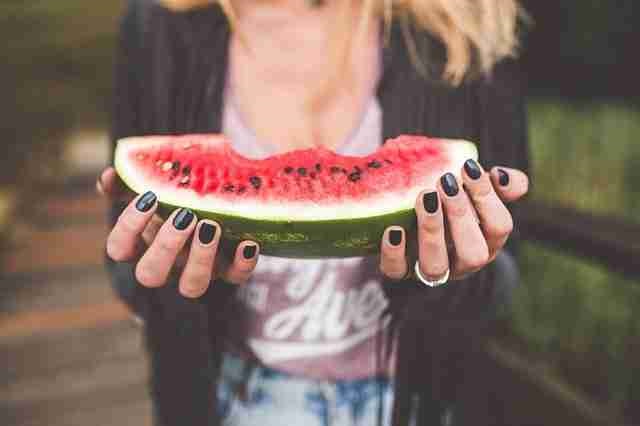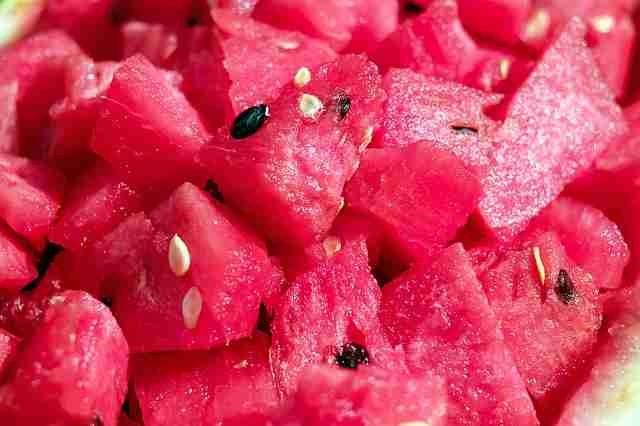During the summer, it’s common to eat fresh, juicy fruit that’s pouring with watery goodness on hot days. With the leftovers, maybe you’re wondering, can chickens eat watermelon?
The simple answer is yes, chickens can eat watermelon but don’t make it a regular part of their diet as it’s high in water and frequent soft fruits can cause crop issues for chickens.

You will find that your chickens will eat the flesh, seeds, and rind and all of them are perfectly safe for your chickens to eat. Just keep the portions small so they’ll eat other foods too.
You can feed watermelon to chicks but personally, I would wait until your chickens are at least 3 to 4 weeks old before you feed watermelon to them to be on the safe side.
Is Watermelon Healthy For Chickens?
Watermelon is full of water but also provides many nutrients that are beneficial to the health of your chickens, however, watermelon should be fed as a treat and not as a staple.
The flesh and seeds of watermelon provide water, potassium, fiber, natural sugar, protein, vitamins A and C, Iron, and magnesium. The rind is also edible and provides roughage.
Whenever possible always try and ensure that the watermelon is organic.
Nutritional Content of Watermelon
| Typical Values | Per 100g |
| Total Fat | 0.2g |
| of which saturated | 0.0g |
| Carbohydrate | 8g |
| of which sugars | 6.0g |
| Fiber | 0.4g |
| Protein | 0.6g |
| Salt | 1.0mg |
| Vitamins and Minerals | |
| Vitamin A | |
| Vitamin C | |
| Magnesium | |
| Potassium | |
| Iron |
Fat
Fat is important in pretty much all bird’s diets, however, at just 2% of fat per 100g serving, then the quantity isn’t a problem. Fat helps birds absorb vitamins A, D, E, and K.
Carbohydrates
Carbohydrates should be limited in a chicken’s diet as carbs don’t really benefit the health of your bird. especially carbs from watermelon as they are from natural sugar.
Fiber
The fiber a chicken receives from a watermelon is very low unless your chickens eat some of the rind. The rind provides roughage which helps to regulate bowel movement.
Protein
At less than 1%, watermelon is low in protein but can still provide a small amount which helps to assist in muscle and tissue repair and skeletal strength and metabolism.
Salt
Salt is minimal in watermelons but it still helps to reduce fatigue, impaired growth, weight loss, and fluid retention, however, naturally occurring salt in their food is enough for chickens.
Vitamin A
Watermelon is a decent source of vitamin A for chickens and it can help with eyesight and assist with feather and skin maintenance.
Vitamin C
Vitamin C is plentiful in watermelons and this important vitamin is essential in helping your chickens deal with stress during laying and also the health burdens of winter.
Magnesium
Magnesium is one of the most important vitamins as it contributes to the maintenance of a chicken’s beak, bones, nerves, and heart health. Watermelons are not high in magnesium.
Potassium
Watermelons are relatively low in potassium compared to other fruits. Potassium contributes to the regulation of proper fluid balance, muscle, and heart function.
Iron
Iron can be harmful to chickens but at this level, it is not a problem. Chickens can find it hard to eliminate iron from their body. Small infrequent amounts are negligible.
How to Feed Watermelon to Chickens
Unless you prepare watermelon in an unorthodox way, I recommend that you serve it as though you were feeding it to a human. Do not add any flavorings etc.

To prepare watermelon to feed to your chickens just rinse the whole intact watermelon under the cold water to remove any contaminants from the rind. The watermelon should be organic.
If you have quite a few chickens then you could cut the watermelon in half and serve it to your chickens. For most people that have just a few then I would chop into slices or chunks.

Due to the high water content and low nutritional properties, I would only serve watermelon as a treat and portion-wise, just the leftovers from your meal that you can’t eat.
Your chickens can eat the rind but to help them consume it I suggest cutting the green rind into very small pieces that can be pecked at. An intact melon with the rind on may be too tough.